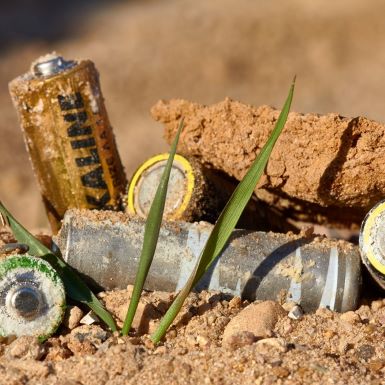THE OPPORTUNITY
The European Space Agency is launching a competition in collaboration with Dott, Voi, and Material Focus to help tackle sustainability challenges relating to batteries, electrical products, electronic waste, and the ICT sector. Solutions can target any part of the product lifecycle, whether it’s improving sourcing of materials for the micromobility industry or helping to recover useful components from landfill sites. Winning teams will receive 80% funding of up to €200,000 to run a year-long feasibility study.
KEY FOCUS AREAS
We would like to see ideas for solutions on the following topics:
- Enhancing the design, sourcing, manufacturing and supply of batteries and electrical goods
- Are there any alternatives to lithium-ion batteries for micromobility services?
- How can traceability of materials and components be improved?
- Can electricals and batteries be tracked through their lifecycle until disposal?
- What types of electricals are sold and in what quantities to whom, and via which channels? - Ensuring safe usage, storage, charging and repair of batteries and electrical items
- What measures can be taken to reduce fire risks of batteries and electrical products?
- What kind of smart charging solutions could improve battery lifespan and optimise operational use?
- How can storage facilities be improved to meet requirements and regulations? - Improving circularity and end of life solutions of batteries and electrical goods
- How much goes to recycling versus legal and illegal export, landfill, incineration, etc.?
- What quantity of materials and components are available for recovery and how can they be recovered?
- How can illegal e-waste activities be detected quickly and monitored accurately?
- How can electronic devices be processed in ways that are not hazardous to health and the environment? - Counteracting the negative environmental impacts of data centres and blockchain-powered solutions
- Data centres generate large quantities of heat; they need powerful cooling systems, which can double electricity consumption and significantly increase carbon dioxide emissions . Similarly, blockchain has a significant carbon footprint. What solutions can counteract these negative impacts?
VALUE OF SPACE

Space technologies and data have an important role to play in the development of services that improve the sustainability of batteries, electronic devices and the ICT sector.
Global Navigation Satellite Systems (GNSS)
- GNSS-based positioning can be used in the development of applications which aim to track battery packs throughout their life cycle and transboundary shipments of disused electrical equipment which may contain illegal e-waste.
- GNSS-based positioning can be used to terrestrial vehicles and operators who investigate and counteract unsustainable operations, to plan and optimise their routes or search patterns.
- GNSS-based positioning can enable the geo-tagging of in-situ pollution or emissions measurements associated with e-waste storage and processing, and data centres.
Satellite Telecommunications (SatCom)
- Satellite IoT networks, including 5G-based, can be used on battery packs equipped to provide the ability of automatically warn emergency responder services in case the pack is breached during an accident, leaking or disassembled without authorisation.
- Satcom can function as a key enabler of satellite-based edge computing solutions.
Satellite Earth Observation (EO)
- Satellite EO can be used for site monitoring where environmentally hazardous operations, take place.
- In combination with appropriate machine learning algorithms, satellite EO imagery can be used to detect illicit battery or e-waste storage and processing facilities, smuggling operations and data processing centres with significant heat or local greenhouse gas emissions.
Intended services can integrate space-based technologies with non-space technologies like machine learning, artificial intelligence (AI), and IoT.
WHAT WE OFFER
We offer funding and support to companies, both for business case assessment and for the development of new, space-based services. Our offer includes:
- Technical & commercial guidance
- Access to our network and partners
- Use of the ESA brand for your service
- Zero-equity funding
Each selected study will receive 80% funding of up to €200K.
Successful teams will also have the opportunity to connect with Dott, Voi, and Material Focus during their feasibility study.
WHO CAN APPLY?
This thematic call for feasibility studies is open to companies that intend to develop space-enabled applications and services relating but not restricted to the key focus areas mentioned above.
Teams from companies or organisations registered in the following Member States are eligible to apply for this opportunity. To date, Austria, Belgium, Czech Republic, Denmark, Estonia, Finland, France, Germany, Hungary, Ireland, Italy, Luxembourg, the Netherlands, Norway, Poland, Portugal, Romania, Spain, Sweden, Switzerland and the United Kingdom have subscribed to ESA Business Applications and Space Solutions (BASS).
Contact information can be found under: National Delegations | ESA TIA.
HOW TO APPLY
- Register by completing the online questionnaire on esa-star registration (this provides for the minimum ‘light registration’): Home - esa-star Registration System
- When this competition launches on 15 December 2022, visit esa-star publications to download the official tender documentation. Official documents will include proposal templates, a draft contract, and additional information about this opportunity.
- Use the official documents to prepare your proposal.
- Write your proposal and obtain a Letter of Support from your National Delegation (see ‘Who Can Apply’ section above).
- Submit your proposal via esa-star Tendering by 30 April 2023.
WEBINAR
Webinars are scheduled for the following dates:
- 11:00 CEST, 19 October 2022
1https://e360.yale.edu/features/energy-hogs-can-huge-data-centers-be-made-more-efficient



